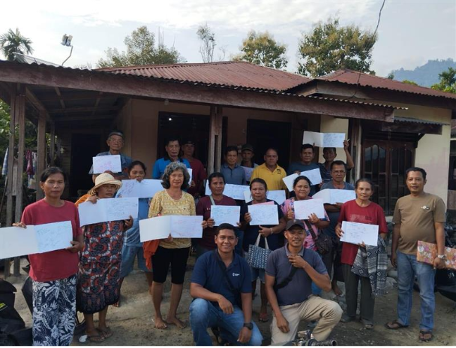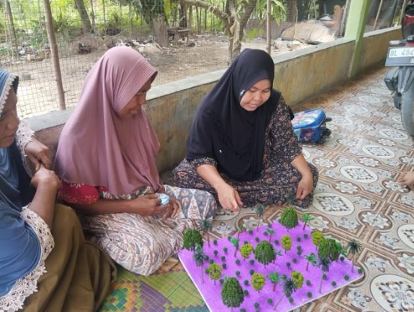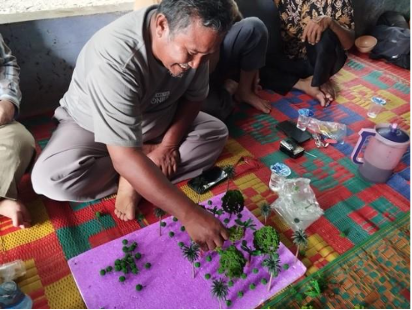Redefining Gender Roles in Cocoa Farming through the Gender Action Learning System (GALS)
- Gusi Ayu Putri Chandrika Sari

- Oct 28, 2025
- 6 min read
Updated: Oct 31, 2025
Editor’s Note
This article is part of the TRANSFORM: BESTARI Challenge impact series. TRANSFORM is an impact accelerator led by Unilever, the UK Government’s Foreign Commonwealth and Development Office (FCDO) and EY, supporting visionary enterprises across Africa and Asia.
Koltiva serves as an implementation partner for PT Kudeungoe Sugata in Aceh, Indonesia, and this series highlights key workstreams within the project. In this article, we spotlight the Gender Action Learning System (GALS), a transformative approach to fostering gender equality and shared leadership in cocoa-producing households. It features insights from Tika Widya Pratiwi, our Agronomy Officer, who leads the GALS training in the region.
Executive Summary
In Aceh, women are central to cocoa production but still encounter structural barriers rooted in tradition, land inheritance, and technology systems that often overlook their roles and contributions. Despite their critical involvement in farm labor, post-harvest handling, and household resilience, women are still excluded from decision-making spaces.
Through TRANSFORM, KOLTIVA is implementing the Gender Action Learning System (GALS) to address this imbalance. GALS is a participatory methodology that equips women and men to collaboratively analyze household dynamics, define their goals, and design inclusive solutions. Using tools like the Production Tree, Family Tree, and Dream Journey, the training creates a shared foundation for decision-making and resource planning.
By mid-2025, 107 producers across 21 villages have participated in GALS sessions, with 16 percent of participants or around 39 people being women. By the end of the program, 500 households (half of them women-led) will benefit from this approach. The results are already visible: 73 percent of participating households report practicing joint decision-making, marking a shift toward more inclusive and resilient cocoa farming systems.
Women play a vital role in global agriculture, comprising 43% of the agricultural labor force and producing up to 80% of food in developing countries (World Economic Forum, 2024). Despite this, they continue to face systemic barriers that limit their full participation. Often, women juggle dual responsibilities—managing household duties such as caregiving and food preparation, alongside labor-intensive farm work. This reduces their available time and productivity, yet their contributions often go unrecognized and undervalued.
In Aceh, Indonesia, gender roles in agriculture are shaped by deeply rooted customs and religious traditions (Shamadiyah, N., & Amalia, N., 2022). Islamic norms, which is widely practiced by people of Aceh, often position men as primary decision-makers and heads of households, while land ownership is typically passed down to sons. These cultural patterns have been inherited across generations, frequently sidelining women from leadership roles in farming communities—even though women have long been indispensable to cocoa farming in Aceh, nurturing nurseries, harvesting pods, and fermenting beans. However, the disconnect between women’s critical contributions and their exclusion from decision-making extends beyond household norms; it is further reinforced by agritech solutions that overlook women’s realities (World Economic Forum, 2024). When women are not recognized as farm leaders or primary users of technology, tools are rarely designed with their needs in mind—limiting both the effectiveness of these solutions and the innovation potential of farms. Studies show that households with active female decision-makers are more likely to reinvest in soil health and diversify income sources—highlighting how inclusive approaches to technology and training can unlock untapped potential in the sector.
Aceh is known for its strong Islamic values, where women are traditionally expected to remain in the domestic sphere. This cultural norm has contributed to the region being less responsive to gender issues. However, through the GALS training, women have begun to gain access to information and are empowered to actively participate in decision-making. Together with their husbands, they learn to share roles more equitably and build a vision for a more inclusive future.
To bridge this gap, KOLTIVA, as the implementation partner of PT Kudeungoe Sugata, is driving a gender-transformative approach with support from TRANSFORM, an impact accelerator by Unilever, the UK Government’s FCDO, and EY. The program delivers digital traceability, farm-level training, and real-time, data-driven decision-making tools. As part of this initiative, KOLTIVA introduces GALS, a participatory and transformative methodology that empowers women and men as equal decision-makers within households and farming communities.

Through participatory and reflective methods, the training encourages participants to analyze challenges, map aspirations, and collaboratively design solutions. GALS uses several core tools to facilitate this process:
Production Tree
Participants identify key barriers to improving cocoa productivity, including technical production issues, gender dynamics, and market access. This session opens space to explore practical solutions and actions that can be taken individually, in groups, or with external support.
Happy Family Tree
This tool guides participants in a deep analysis of household labor division, financial management, decision-making, ownership dynamics in households and cocoa farms. The process promotes more equitable and fair relationships within families, strengthening the social foundation of farm management.
Dream and the Journey of Dream
The Dream Journey is a space for reflection and future planning. Participants visualize their dreams and identify strengths, weaknesses, challenges, opportunities, and other factors that influence their path toward achieving those dreams. It serves as a motivational roadmap for sustainable personal and collective transformation.
GALS session in Lawe Kulok Village, Lawe Bulan Subdistrict, focused on gender themes. (Right): A woman enthusiastically completes her “Dream Journey” drawing—one of the core tools used in this GALS session.
Harnessing GALS, Sugata’s Producer Engagement team has guided 107 producers (16 percent women) through 26 participatory sessions across 21 villages. Here, men and women map household resources, chart decision pathways, and craft cooperative action plans. By December 2025, the program aims to reach 500 households, 250 of them involve women. Through the implementation of Good Agricultural Practices (GAP) in cocoa cultivation, Diversified Cocoa Agroforestry (DCA), and the reduction of cocoa waste in the field, these outcomes reflect the tangible results of the ongoing training and reflects joint planning. As many as 73% of trained producers are now able to practice joint decision-making, marking a shift toward more equitable household dynamics, deeper gender understanding, better farm management, and a shared commitment to decisions that enhance both family well-being and agricultural success.
Ultimately, GALS seeks to transform cocoa households into collaborative enterprises, where shared leadership breeds resilience against market and climate uncertainties.
A small group of female and male producer representatives in Sebudi Jaya village created an agroforestry garden design using a DCA model.
We promote agroforestry training not only as a strategy to mitigate climate change risks, but also as an approach that encourages equitable role-sharing within farming households. Through GALS training, the division of roles in the field between husbands and wives becomes more open and fair, enabling collaborative and sustainable agroforestry management.
“I’ve seen so many women doing the hard work on the farm but never getting a say in the decisions. GALS is powerful because it changes that. It helps women speak up, and it helps families listen. As a trainer and a woman, it’s inspiring to watch people start dreaming and planning together, like real partners,” said Tika Widya Pratiwi, our Agronomy Officer as the Gender Action Learning System Training Lead.
When women and men lead together, families thrive, farms improve, and communities build resilience against economic and climate uncertainty.
Want to learn more about how inclusive training is reshaping the future of farming? Talk to our experts and stay tuned for upcoming articles exploring the other workstreams of Sugata’s project supported by TRANSFORM.
Author: Daniel Agus Prasetyo, Head of Public Relations & Corporate Communications
Co-author: Gusi Ayu Putri Chandrika Sari, Social Media Specialist
Subject Matter Expert: Tika Pratiwi, Agronomy Officer
Daniel Agus Prasetyo brings over a decade of cross-industry experience in corporate communications, sustainability, and stakeholder engagement. At KOLTIVA, he contributes to advancing initiatives that connect business growth with social and environmental impact. He is passionate about fostering collaboration and empowering communities, believing that meaningful progress happens when communication bridges purpose and people.
Gusi Ayu Putri Chandrika Sari combines her expertise in digital marketing and social media with a deep commitment to sustainability, supported by over eight years of experience in communications. Her work focuses on crafting impactful narratives that connect technology, agriculture, and environmental responsibility. She is driven by a passion for promoting sustainable practices through compelling, audience-focused content across a variety of digital platforms.
Tika Pratiwi is an Agronomist Officer at Koltiva, dedicated to advancing sustainable and traceable agricultural practices across West Kalimantan. With a strong background in agronomy, she works closely with smallholder farmers to implement effective Internal Control Systems (ICS) and ensure compliance with sustainability standards. Through her field engagement and data collection efforts, Tika plays a key role in bridging on-the-ground realities with Koltiva’s digital traceability platforms—empowering farmers to improve productivity, strengthen transparency, and contribute to climate-smart supply chains.
Resources:
Shamadiyah, N., & Amalia, N. (2022). Food Security, Women, and Higher Education in Aceh. Proceedings of Malikussaleh International Conference on Multidisciplinary Studies (MICoMS), 3, Article 00053. https://doi.org/10.29103/micoms.v3i.217
World Economic Forum. (2024). Agritech for women farmers: A business case for inclusive growth. Centre for the Fourth Industrial Revolution. World Economic Forum. https://reports.weforum.org/docs/WEF_Agritech_for_Women_Farmers_2024.pdf


















Incredible to see how GALS is not just training farmers, but transforming mindsets! When women and men share decisions, the entire farming system becomes stronger, more resilient, and truly sustainable.